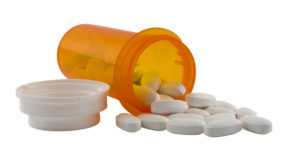 A recent large study (using health data from the United Kingdom) found that children and adults who took five commonly prescribed types of antibiotics had an increased risk of developing kidney stones, compared to people who didn't take these antibiotics. The five types of antibiotics were sulfas, cephalosporins, fluoroquinolones, nitrofurantoin, and broad-spectrum penicillins. The antibiotics were taken orally (by mouth).
A recent large study (using health data from the United Kingdom) found that children and adults who took five commonly prescribed types of antibiotics had an increased risk of developing kidney stones, compared to people who didn't take these antibiotics. The five types of antibiotics were sulfas, cephalosporins, fluoroquinolones, nitrofurantoin, and broad-spectrum penicillins. The antibiotics were taken orally (by mouth).
However, not all antibiotics were associated with an increased risk of kidney stones. The study examined 12 types of antibiotics, and found seven types that didn’t appear to influence the risk of kidney stones.The strongest risks for kidney stones were in children and adolescents, and with more recent exposure. The risk of kidney stones decreased over time, but remained elevated several years after antibiotic use.
The researchers pointed out that recent studies have found differences in the gut microbiome (community of microbes) between patients with kidney stones and those without kidney stones. And that studies find that the use of antibiotics disrupts the microbiome. (here and here) Another reason to only take antibiotics when absolutely necessary. From Science Daily:
Oral antibiotics may raise risk of kidney stones
Pediatric researchers have found that children and adults treated with some oral antibiotics have a significantly higher risk of developing kidney stones. This is the first time that these medicines have been linked to this condition. The strongest risks appeared at younger ages and among patients most recently exposed to antibiotics.
"The overall prevalence of kidney stones has risen by 70 percent over the past 30 years, with particularly sharp increases among adolescents and young women," said study leader Gregory E. Tasian, MD, MSCE, a pediatric urologist at Children's Hospital of Philadelphia (CHOP). Tasian noted that kidney stones were previously rare in children.
Study co-author Michelle Denburg, MD, MSCE, a pediatric nephrologist at CHOP, added, "The reasons for the increase are unknown, but our findings suggest that oral antibiotics play a role, especially given that children are prescribed antibiotics at higher rates than adults."
The study team drew on electronic health records from the United Kingdom, covering 13 million adults and children seen by general practitioners in the Health Improvement Network between 1994 and 2015. The team analyzed prior antibiotic exposure for nearly 26,000 patients with kidney stones, compared to nearly 260,000 control subjects.
They found that five classes of oral antibiotics were associated with a diagnosis of kidney stone disease. The five classes were oral sulfas, cephalosporins, fluoroquinolones, nitrofurantoin, and broad-spectrum penicillins. After adjustments for age, sex, race, urinary tract infection, other medications and other medical conditions, patients who received sulfa drugs were more than twice as likely as those not exposed to antibiotics to have kidney stones; for broad-spectrum penicillins, the increased risk was 27 percent higher.
